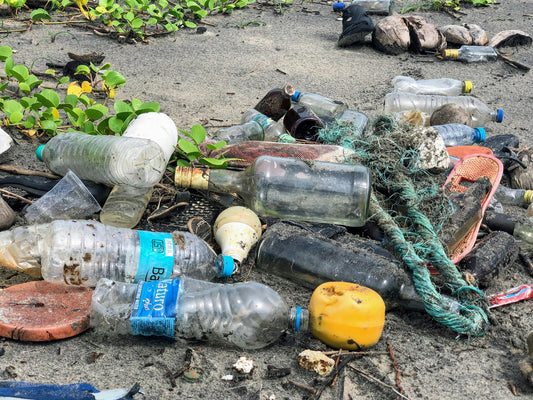Share
Sustainability has long been a trend in various economic sectors.
Corporate social responsibility has become an important factor, with firms seeking to associate themselves with environmental and social issues to meet the demands of responsible consumers.
However, not all that glitters is gold. Or not all that seems sustainable, truly is.
Bluewashing is a term you may have come across but probably have not clearly understood.
In this blog post, we will explain what bluewashing is and how companies have been using it for their benefit.
Bluewashing Definition
If you've been reading our blog, you will be familiar with the definition of greenwashing, which is deceptive technique that companies use to present their products or practices as being more environmentally friendly than they really are.
Read our articles on greenwashing here.
This can be done by highlighting the green attributes of a product while not mentioning in any way the harmful practices that are taking place in other parts of the company.
If you apply that same problem to social responsibility, you get Bluewashing.
Bluewashing is a deceptive marketing tactic that overstates a company's commitment to responsible and sustainable social practices.
The term has been coined to refer to companies that signed the United Nation's voluntary initiative on social impact, but didn't adhere to its policies.
Hence, they were accused of Bluewashing, referring to the blue United Nations flag.
There are many tactics that company use, which fall under the umbrella of Bluewashing.
Common Bluewashing Tactics

Selective Reporting:
Companies create representations that may contain a few positives that organizations wish to showcase while masking other larger unethical behaviors.
For instance, they might claim to be contributing to charity by donating a few cents to a cause while engaging in continued labor rights abuses.
Primark is a fast-fashion retail company that has been exposed for focusing on small-scale beneficial impacts on communities. It has also been accused of various severe labor abuses in its supply chain.
Some of the findings have shown that workers are exposed to poor working conditions and children are involved in the manufacturing processes in nations such as India and Cambodia, a scenario that is in sharp contrast with the ethical standpoint that the company wants to portray.
Misleading Partnerships:
Partnering with reputable social organizations can create the impression that the firm is committed to ethics. Many companies use these organizations for public relations purposes but do not always uphold their standards.
Nestle has sometimes used its connections with other reputable social organizations to support its image.
However, the company has received criticism for employing child labor and other unethical practices in production.
Critics have noted that through affiliations with such bodies as the UN Global Compact (UNGC), Nestle has sought to construct an ethical veneer where no real changes have been made to its deleterious impacts.
Vague Claims:
Making sweeping and unsubstantiated claims about social responsibility, such as stating that the company cares about ‘fair treatment of workers’ but does not provide proof of their social compliance standards.
L’Oréal has been accused of overemphasizing the problem of modern slavery and its solutions and making unsubstantiated claims.
The Negative Consequences of Bluewashing

Eroding Trust:
Bluewashing compromises the credibility of firms and brands. When consumers find that a company is involved in mere hype or outright lying about being sustainable, they do not believe even genuine environmentally friendly businesses.
According to Edelman’s 2020 survey, only 44% of consumers trust brands' statements about their environmental impact.
Undermining Genuine Efforts:
Bluewashing weakens the genuine sustainability efforts put in place. While some companies go out of their way to bring positive changes to the environment, these are often overshadowed by other companies that just want to grab headlines and attention.
While real corporate sustainability initiatives can greatly reduce environmental impacts, the common problem of bluewashing undermines their potential.
Consumer Manipulation:
Brands that engage in bluewashing deceive consumers who want to make an ethical choice by choosing sustainable products when they are not.
This manipulation of consumer benevolence is not only deceptive to buyers but also counterproductive to the collective development of a better world.
Many fast-fashion brands advertise that they incorporate ‘sustainable’ fabrics and manufacturing processes, yet they remain involved in processes that are detrimental to the planet and workers.
Policy Impact:
Bluewashing is dangerous because it can sway policymakers into making decisions based on a perceived advancement in a certain direction.
The government and other policymakers could be easily deceived into thinking that initiatives and measures taken voluntarily by corporations are sufficient and that there is no need for more stringent laws and rules.
Research carried out by Harvard Business School shows that corporate lobbying and falsehoods can greatly slow down much-needed environmental regulations.
Taking Action Against Bluewashing
Consumers need to act to tackle the problem of bluewashing. First and foremost, the costumes should call for more openness and factual data regarding the effects of products and services on sustainability.
This ensures that companies are always responsible for their statements and cannot post anything they want.
Backing genuine brands with their history of sustainability can create a desire for genuine sustainability, making more companies become real and implement meaningful changes.
Did you know about the impacts of bluewashing? Feel free to leave a comment below.
We hope you enjoyed this article. If you want to read more like this, make sure to check out our Blog and follow us on Instagram. If you are interested in truly sustainable products, check out our Shop.








